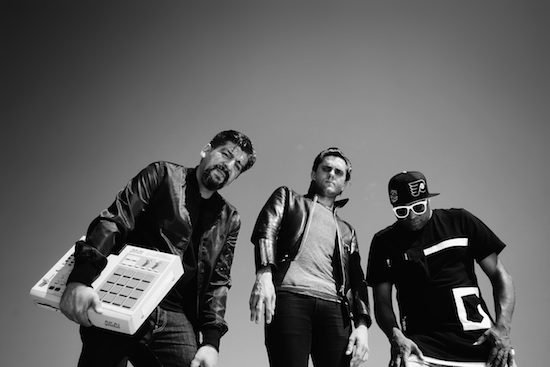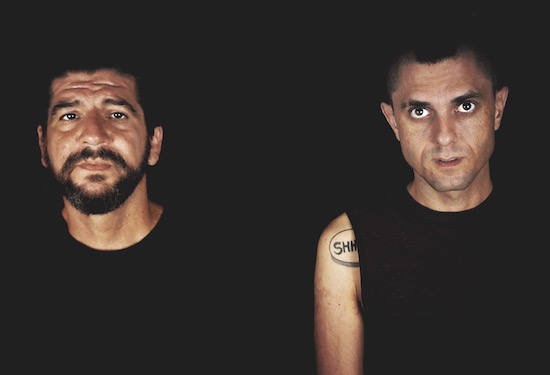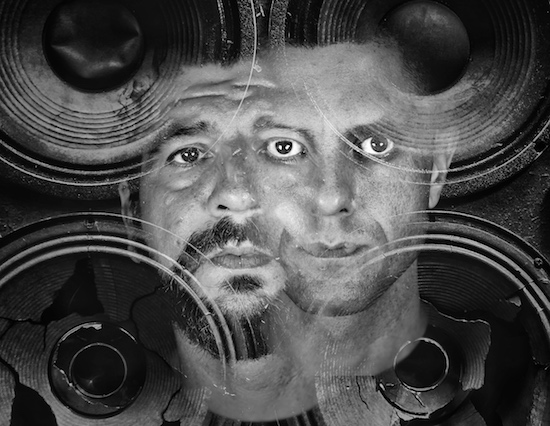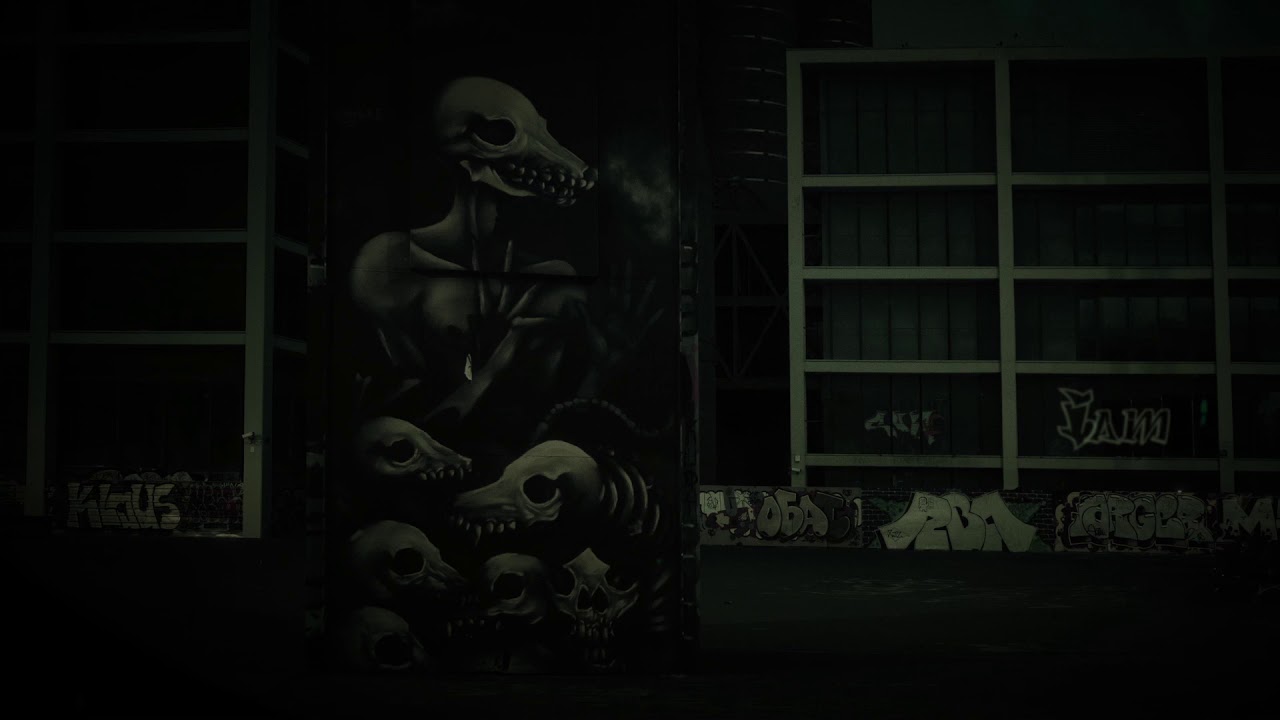Planet B portraits by Becky DiGiglio
Justin Pearson, best known for his role in The Locust, the impenetrably weird and costumed powerviolence collective, lies upside-down on a sofa in a New York record shop rapping into a fisheye. Yes, rapping. In a few moments, Kool Keith (yes, Kool Keith) seated next to Pearson and sofa-dancing endearingly, will provide a show-stealing guest verse.
The crashing beat (which sounds a bit like an extra-noisy Run the Jewels), is the responsibility of producer Luke Henshaw, who frowns sternly down at his MPC throughout. It’s an odd scene.
“I’ve spent most of my musical life not trying to have an obvious genre,” Pearson explains.
This, the latest project in a career for which ‘perplexing’ could be a watchword, is Planet B, the weirdo hip-punk duo of Pearson and Henshaw. Their first outing, a self-titled album, is released this month. Kool Keith’s appearance is on lead single ‘Crustfund’.
“I just call the music I play ‘annoying’ whenever anyone asks,” Pearson laughs. “It’s abrasive and jarring to some, and that’s the point. I think ‘annoying’ is funny and open-ended, and maybe someone’s going to be interested in that and want to go figure out what it sounds like.”
Pearson comes across as a passionate hip-hop fan frustrated by the aesthetic of its present flag-bearers. As a youngster he was “super into KRS-One” and cites the Beastie Boys, Public Enemy and Run DMC as favourites.
“I’m a huge fan of MIA,” he adds. He sees her as an exemplary punk, and as a figure the Soundcloud generation should learn from. “Obviously she’s not a kid with a MacBook in her house making beats, but she’s such an innovative artist. The sounds that she samples are so unexpected.”
Pearson admires the DIY spirit integral to modern hip hop, but isn’t shy when it comes to what he thinks the genre lacks.
“A lot of it is very misogynistic, and has weird elements of not addressing social politics or class issues or something so I feel like it’s hard to get behind the lyrics. A thing that bums me out about it is that so much is about getting fucked up. Like, okay, cool, you’re on drugs. And it’s a lot like punk — there’s a lot of shitty punk out there, and I think nihilism is a he problem for peoples’ perception of punk rock.”
Next, we get into how things actually sound.
“Soundcloud rap seems lazy to me. I feel like it needs to have more to it. I think people are too satisfied with preprogrammed beats or sounds. You should make your own sounds. Luke samples shit off records, and he would go to swap meets and go to the garbage 25 cent bin and get all the shitty records because he wanted it to sound gritty and have glitches in it. It doesn’t matter if it skips because you only need a few seconds. Or he’d do shit like take the RCA cable that would be running into his sequencer of sampler and put a thumbtack through it and fuck up the connection to make it sound nastier.”
Soundcloud, for Pearson, lacks this experimental spirit.
“People just use their computer and don’t venture out. What about having gear? What about running an 808 through a weird-ass bitcrusher? People take it at what they got. They don’t try to experiment, they don’t think ‘OK, everybody else has the same trap drum beat.’ That sound is everywhere. It’s not unique. I think people could be a bit more creative.”
I understand Pearson’s perspectives, but I don’t share them. Arguing that there’s not an enormous amount of feeble hip hop floating around is a waste of time, because there undoubtedly is. But that’s the case in any genre — a catchy sound, vibe or production hallmark one day can become a monopolistic trend within weeks thanks to the internet and what it’s done to our appetites for art. We hear something good, we want more like it — and the musicians who aren’t setting trends themselves are often disregarded if they fail to keep up.
But to overlook Soundcloud purely on the basis of its conspicuous popularity ecosystem is a mistake. Sure, for every absurdist masterpiece like Die Lit there are a thousand artists like Warhol.ss or Lancey Foux, paddling gamely in the wake of the bigger and better established figures. But the speed of communication between artist and audience, the truncated release cycle, the kind-of-kidding-not-really fixation on clout and reach all work to ultimate benefit of the kids to whom catchy hip hop is provender. It’s exactly like punk: once you find an artist or a sub-scene that makes sense — once you hit a vein — you can keep going and going. And that feeling of discovery, of exploration, is invaluable for a young person (however algorithmically superintended that process now is).

Experimental hip hop doesn’t get much better than Kool Keith for Pearson. When he talks about Dr Octagon it’s easy to tell he’s longing for more of that style of disruption in modern rap.
“When I heard [Dr Octagonecologyst] it kept me 100% engaged. And using Pushead for the artwork and stuff was amazing and brilliant. It seems like a Septic Death record cover or something. I thought it was a perfect record when it came out, and it still is a perfect record.”
Keith is, apparently, pretty close to being as weird as he seems.
“It was pretty surreal hanging out with that dude. Being around him in that situation was kind of like what you would expect from the lyrics and his antics. He’s very genuine. He’s really fucking out there. How we perceive him is totally accurate — it’s not a gimmick. Working with him was a trip.”
He goes on to allude to an array of bizarre stories from Keith’s life related in detail by the man himself. Of course, it’s my journalistic duty to request that Pearson give a secondhand account of one such tale. He declines politely.
“They’re just so weird. I think I need to refrain.”
Another heavyweight Planet B collaborator (and personal milestone for Pearson) is Martin Atkins of Killing Joke and Public Image Ltd fame. Atkins appears on the album’s penultimate track ‘Come Bogeyman’, a ghoulish and atmospheric cut with vocals informed by 80s horror.
“We were both speaking at a conference at San Diego some time ago, and he came out and saw Retox play a show that night and we hung out. He had me lecture at one of his classes in Chicago. We got together and jammed and recorded some improv stuff and kind of just went from there. The dude’s awesome. Every time that guy speaks it’s amazing.”
Like Keith, Atkins is reportedly a great raconteur. Pearson interviewed Atkins in-depth on his podcast, ‘Cult & Culture.’
“He’s such a good storyteller and he’s got so much history. The way that he takes you on these journeys through the situations he’s talking about it really great. You’re really able to wrap your head around things that I think a lot of people might not be able to fully understand, and its’s a trip. His whole goal is to make two fans a night. As long as he makes two fans a night, he’s successful. And this is the dude that’s been in some of the raddest bands. He was on the best PiL records and his whole goal is to make two new fans a night. It just seems fucking crazy, you know? Two!”
The album also features a Depeche Mode cover. Planet B’s rendition of ‘Never Let Me Down Again’ is, unsurprisingly, a world away from the original and was recorded as part of Love Oakland, a Loose Grip records compilation benefiting the Oakland Family Fund. The charity was set up in the wake of the Ghost Ship fire, a DIY venue and art space which tragically burned down in 2016 and resulted in 36 deaths.
“I’ve never been [to the Ghost Ship],” Pearson says, “but I know a lot of people that were part of it and it’s something I think a lot of musicians or artists can relate to. I think I’ve probably spent more of my life playing in venues like that than playing in traditional venues.”

Planet B plan to tour in 2019, with a stage setup involving a live drummer alongside Henshaw’s programming. It’s a challenge for Pearson, who is used to a <a href="https://www.youtube.com/watch?v=8VCEZAHqrsQ&t" target=“out">decidedly different style of performance. But Planet B seek out the unfamiliar.
“When we first started working together the beats were sort of chill, not aggressive enough. I’d be like ‘Dude, I can’t scream over this.’ It was rad, but it was softer. When we first got together we were working on doing this Britney Spears cover and all this random shit.
Luke is open to me suggesting things and I’m so grateful for that because I don’t want to be a dick, and I also don’t want him to be like ‘This is how it’s going to be and you have to deal with it.’ We decided it had to be harder and bigger and meaner.”
The political climate of 2018 makes meanness a necessity for Planet B.
“I think [anger] in music is totally relevant for the times we’re living in. We should be pissed and it should reflect in art.”
Planet B’s debut album is out now on Ipecac




